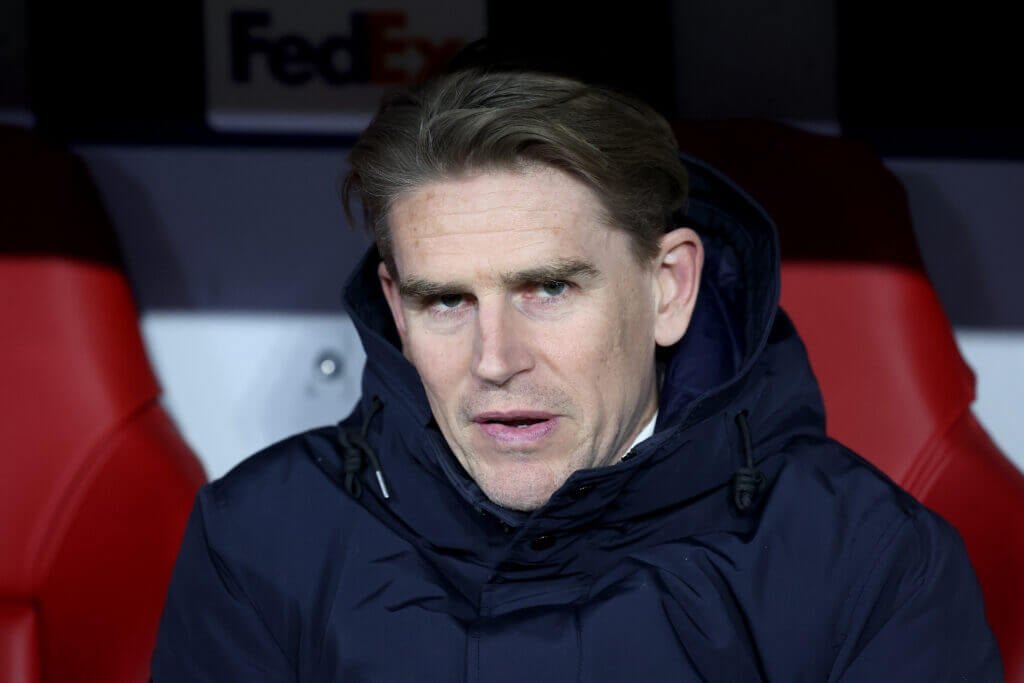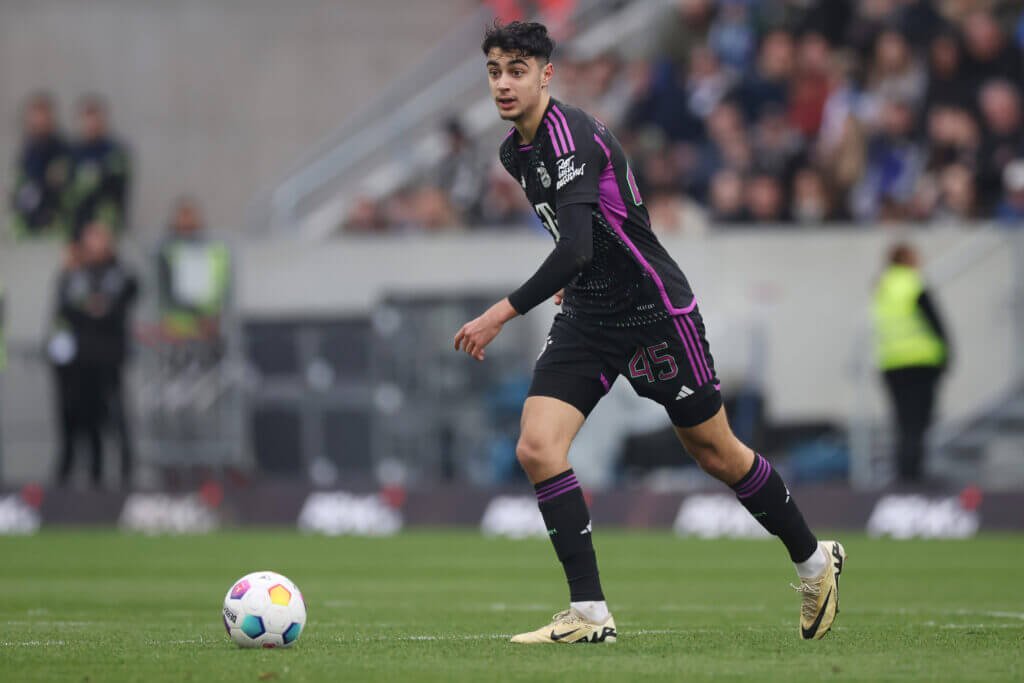What next for Bayern Munich?
Their immediate future will not involve Xabi Alonso. With Thomas Tuchel due to leave Sabener Strasse at the end of the season, Alonso, who is on the cusp of taking Bayer Leverkusen to their maiden Bundesliga title, had been the favourite to succeed him.
That is no longer the case. Alonso confirmed at a Friday press conference that he will be staying at Leverkusen for another year at least. Regardless of how this season finishes, he sees his job as incomplete.
So what does this mean for Bayern?
Antonio Conte and Jose Mourinho are not under consideration; Bayern do not want the friction. The fatigued, post-Liverpool Jurgen Klopp is not part of the conversation, Sebastian Hoeness has signed a contract extension with Stuttgart, and Julian Nagelsmann is planning for the European Championship with Germany. Unlike in previous eras with Jupp Heynckes and Hansi Flick, Bayern cannot call upon an experienced statesman to assume the role either.
There are really only two candidates — and questions to answer over why Alonso was not an option.
First of all, why did Alonso decide to stay at Leverkusen?
The assumption was that Alonso would leave Leverkusen after winning them the Bundesliga this season. With eight games left, his side are 10 points clear of Bayern — and it was not only the German giants that he was being linked to. His former club Liverpool also need a new manager when Klopp leaves.
With either club offering an elite option for any up-and-coming manager, it was something of a surprise when, on Thursday night, it emerged Liverpool had been aware Alonso would stay at Leverkusen — and had moved on to other targets.
This is something Alonso confirmed on Friday. “My job is not over here (at Leverkusen),” Alonso said. “Putting everything together, I’ve taken this important decision. I am convinced it’s the right one.
“This is my first full season as a manager. I still have a lot of things to prove and to experience. Right now, I have a situation where I feel really stable and happy.”
Understandably so. Leverkusen are not expecting many departures in the summer and Alonso will have the chance to take a young, settled and highly talented squad into the Champions League. Alonso has a harmonious relationship with Fernando Carro and Simon Rolfes too, the club CEO and board director for sport respectively.
Alonso with Rolfes (Sebastian Widmann/Getty Images)
Such tranquillity in football is rare, so little wonder that he described Leverkusen as being “the perfect place” for him and he felt unable to walk away from their unrealised potential.
Alonso might have managed Real Sociedad B before joining Leverkusen in October 2022, but this is still his first season in the top flight as a head coach. “At the moment, this is the right place for me to develop as a coach, I am a young coach,” Alonso added on Friday. “I have to thank the management. The club has been supportive and I feel respected by all departments.”
Back to Bayern — why is Ralf Rangnick an option?
Given his short, unhappy time at Manchester United, Ralf Rangnick might be a surprise inclusion. But that six months in England is less relevant than his influence on the Austrian national team.
His time at Old Trafford was limited in scope, with Rangnick operating as little more than an interim head coach with no say on squad composition. At Bayern, his situation would be the opposite, which would be part of the attraction for both Bayern and Rangnick. Rangnick’s work in qualifying Austria for the European Championship has been broader and more holistic than his time at United.
Rangnick has his side playing much bolder, more attacking football than his predecessor, Franco Foda, and has built a harmonious environment. Around it, the atmosphere has improved immeasurably. Austria’s games have been played around the country as Rapid Vienna would not allow them to play at their stadium. Rangnick was keen to use smaller venues for the smaller qualifiers that would be more likely to sell out, which is why they have regularly played in Linz. This has led to more solid attendance during the run to Euro 2024 and emotional buy-in from the public.
The breadth of that influence suits the scale of the Bayern task. It’s an understatement to say that the current team has reached the end of its cycle. Alphonso Davies’ future is unclear. Joshua Kimmich and Leon Goretzka have uncertain roles next season, too. Manuel Neuer and Thomas Muller are in their career twilights. Solving those issues will involve technical and recruiting challenges, certainly, but social ones, too: these are not just important players, but big, powerful personalities that need handling with care.
Bayern have already remodelled in readiness. Christoph Freund was appointed as sporting director in 2023. Max Eberl followed as board member for sport in early 2024. These roles are yet to be fully defined and it’s still not clear how much influence Bayern’s elders, Uli Hoeness and Karl-Heinz Rummenigge, will have. But, notably, Freund was previously sporting director of Red Bull Salzburg, working within the system that Rangnick designed.
That’s a convenient straight line. Of course, it’s not as simple as just aligning people who have the same set of technical beliefs. Nevertheless, Freund and Rangnick are believed to get on well and there would be at least some logic in uniting them.

Freund worked at Red Bull Salzburg from 2015 to 2023 (Alexander Hassenstein/Getty Images)
And harmony is important at Bayern. In recent seasons, there has been a dressing-room disconnect between coaches and players. Lack of permanence has certainly contributed to that. Since Pep Guardiola left in 2016, the club have had six full-time coaches, each working for roughly 18 months each.
The effect has been a blurring of tactical identity and an unhelpful shuffling of the squad’s composition. The connection between players and coaches has often been frayed, too, and that’s something that the club would doubtless like to change. Bayern want a strong and unified dressing room — and neither Nagelsmann nor Tuchel have been able to provide that.
Can Rangnick? That’s unclear. But given the gravitas he continues to enjoy in German football and the range of his potential effect, on the pitch and away from it, he might be as good an option as there is at this point in Bayern’s history.
Could Roberto De Zerbi be under consideration?
De Zerbi is a fascinating option for Bayern.
Amplifying his daring football with Bayern’s talent is a compelling prospect. Leroy Sane, Jamal Musiala, Harry Kane; who would not want to watch that trio within his system?
But what likely intrigues Bayern is De Zerbi’s record of trusting and developing young players at Brighton. One of the broader aims that this next appointment needs to address is the lack of coaching longevity; they want to put someone in place for three, maybe five years. Partly for stability, but also because it would coincide with the rise of some extremely gifted players.
Aleksandar Pavlovic is the kind of forward-passing midfielder that De Zerbi would depend upon. The returning Josip Stanisic (on loan at Leverkusen) has an attacking ambition with the ball that would suit him, too.

Pavlovic is a star in the making at Bayern (Alex Grimm/Getty Images)
Further down, the club have a group of highly technical ball players in their academy who might as well have been raised specifically for a coach with De Zerbi’s quick, sharp attacking style. Lovro Zvonarek and Javier Fernandez are a pair of artisan midfielders. Matteo Vinlof is a slick, smooth left-sided full-back. Adam Aznou can play anywhere on the left side and is already training regularly with the senior team.
That will be quite an inheritance. But De Zerbi’s candidacy is curious, because Bayern is a deeply political club, and the Italian seems unsuited to that: to the interference that can come from outside and above, and to the unrelenting media focus.
For those outside Germany, the attention that Bayern attract is roughly equivalent to what Manchester United, Liverpool and Arsenal receive in England. Combined. They are the most popular and successful club in a country dominated by a single sport. Bayern are the main story every day of the year, in a way that might not suit the personality of a coach who has been volatile at a club of Brighton’s size.
But perhaps the bigger mark against De Zerbi is that he is just a head coach when the club are looking for someone capable of a wider remit. Bayern are searching for more than just tactics and training. They need vision and direction, executive finesse and political savvy. De Zerbi probably lacks the dimensions for that kind of job.
(Top photos: Getty Images)
Read the full article here


